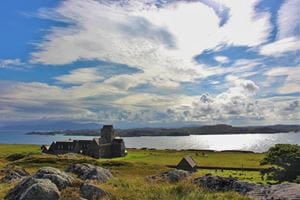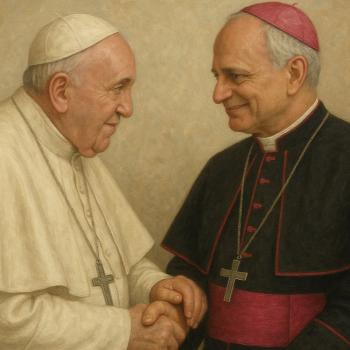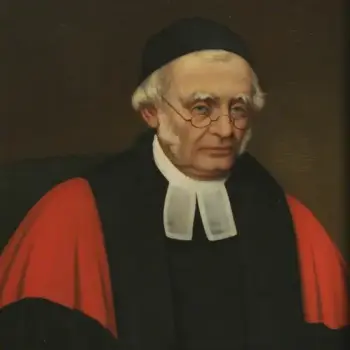
Check out Sacred Spaces: The 100 Most Holy Places on Earth
I’m more and more aware now, years after having written A Song among the Stones, the sequence of poems re-imagining the voyages of the Celtic Christian hermit monks, that they were going to places composed of nothing. And really that was the whole reason for the title: they were going to places to sing and pray among the stones.
Precious few of these papar locations are whatever could be described as beautiful: quite the opposite, it is as though the monks deliberately sought places that were bare and open and unadorned. They were in the very teeth of the wind; they were facing the sea; they were on the edge of the storm.
Yes, we have seen at times there was the same rather sad desire for hierarchy that we recognize both inside and outside the religious world we know today. But leaving that to one side, I feel that in essence this is what they were seeking: austerity, sparseness, nothingness. Yes, that seems at the very heart of it: nothingness. Yet somehow there is still beauty in the very depths of that simplicity.
I have a picture that I took of making a small fire among the rocks at St Columba’s Bay on Iona not so very long ago. It was probably in October, when Kristina and I lead the annual Celtic Christian retreats on the island. Often, in fact almost invariably, the days are grey and bare because the year is closing in and nearing its end. The colours have gone and sea and sky are often as one. That tiny fire set in the rocks became a thing of beauty, lighting the surrounding rocks and changing the half-darkness all around, becoming more than itself. This is another short poem I wrote about the papar monks not long after I first heard of them.
What drove their feet to these scree islands
scarcely more than whalebacks in the sea
to build shale haystacks under one huge grey wind;
to spend their dust of years huddled in the keen
of sleet and rain on islands gnawed to knucklebones
of winter gale? Nothing but this flint of faith
that lit a single flickering of lamp, and the sun
that after dark burst big and orange, beautiful
through morning, sometimes, to everything the heart.
But I am supremely aware I’m not made of that kind of material. Mine is the coward’s way: I want the pilgrimage to the beautiful place where there may be comfort and warmth, not austerity and cold. I have been to places that might well have been chosen by the papar monks, and I have managed a few minutes there before scuttling off gratefully, defeated by the cold. And this is a poem that rather responds to the earlier one – The Search from Out of the Ordinary:
Who was it who decreed
we must find God
through the hard labour of hunger
or years of rocky islands?
Why should God not also be
found listening in a simple glade
where morning is being born
in the soft calling of birds?
The truth is that there’s a good part of me that believes this entirely, that does feel the whole idea of finding ultimate austerity among the rocks and the storm is not what God demands at all. But I know too that I want my pilgrimage and my retreat place to be comforting, to offer solace, and not to challenge too much the comfortable 21st Century man that I am. If God does not demand austerity, how much does he really want my comfort? In the depths of my heart I know that great comfort is just wrapping me in a lovely snugness of garments, in a place where I will neither see nor hear nor touch as I must, as I should. If I am so lost in comfort, I will not learn; I will just be comforted. And that is not enough.
I realise too that pilgrimage in our day and age can be about long and expensive journeys to special places. I understand that some Christians may feel they need to experience the Holy Land: Bethlehem, the Sea of Galilee and Jerusalem: to feel they have walked in his footsteps. They need to feel their faith in the reality of all the places where the story happened. Well, for one thing I’m not sure the planet can afford all the travel. Twenty or thirty years ago we didn’t know quite how bad things were, but now we do. It’s not simply journeys of pilgrimage we must be questioning now, but surely all our journeys. Our footprints are very heavy on the earth, and we finally need to start being caretakers of a precious creation.
But I’m very aware of being fortunate in not feeling any need to find the places where Jesus walked and talked. I realise it’s easy for me because I don’t have any desire to walk in Bethlehem or hear the lapping lake water of the Sea of Galilee. I feel it more strongly still: I don’t have any desire to go to the Holy Land on pilgrimage. Yes, I might find myself surprised by the experience, but it’s my belief it wouldn’t deepen my faith or awaken anything new within me. I am aware instead that too much may have been built on the real places where Jesus was, that too many gilded floors would muffle my experience of them. But I repeat that I understand I’m fortunate here. I appreciate what I’ve been given.
My pilgrimage instead to these places and stories is through the imagination. It’s hard to explain how it happens; I only know that it does. And it doesn’t only occur in relation to faith. All at once I’m pulled into story: I experience the place of someone’s life and experience it so vividly it feels absolutely real for the time it lasts – and it never does last very long at all. I’m there in that place and that life with complete intensity, and often it happens without the slightest warning, quite out of the blue. And as quickly as it comes it passes once more. I have to catch the words in the time in between.
This is precisely how I experienced the resurrection poem I’m about to share. I was there: I felt there in the boat and I found myself watching the shore. I suppose in all this there’s something rather Ignatian: this is poetry coming out of Ignatian-like practice. Except that nothing conscious has preceded the coming of the experience. I would like to be able to claim that I’d been reading those verses again and somehow entering the story in that way, but it wouldn’t be true. The writing is a kind of pilgrimage in itself: for the time it lasts I’m transported; I feel somewhere else. I’m deep in the water of the story, as it were, and all my sense are alive to it. Somehow I’m more there than here.
It was over. They left Jerusalem in the dead of night;
no light alive, the grey rock of the last days
raw and jagged in their throats.
They were fishermen, went back, broken
to the only thing they knew, to Galilee.
And all night nothing;
the skies aubergine, a piling of bruised clouds,
the lake eerie and moonless, creeping with shadows,
the cold leaking into feet and hands like leprosy.
Dawn was a wound in the east, a gash,
the twist of a rusted knife.
And there a figure on the shore beside a fire;
someone who seemed to wait for them.
They drudged up the boats, deep into dry sand.
He spoke to them with his eyes,
gave them pieces of smoky fish.
They knew him when he called them by their names.
In every sense, I feel, the pilgrimage has to be about coming home. It’s not that I can’t go to Iona (for that would be the place of pilgrimage for me every time), but I do have to stop being in danger of escaping to it and feeling that nothing can happen in my heart beyond the island. I think of something practised by the Iona Community. During the season there’s a pilgrimage on the island each and every week. It lasts the best part of the day and visits all the special places; all the most important sites as it were. Inevitably some considerable time is spent on St Columba’s Bay, the place where the saint landed all those centuries ago from Ireland. And, inevitably, some of that time on the beach is spent searching for special pieces of polished serpentine that have been brought in by the sea; beautiful mottled white and green pebbles, as though they carry within them still a memory of Ireland. When that group of pilgrims is all set to leave Iona once more, they’re told to think of keeping in their pockets one of the pebbles they found on the beach. To take a piece of Iona back to their own homes. Something of the island goes with them, whether to Nairobi or Nicaragua or New Orleans. It’s about carrying the island and the spirit of what they found.
So I feel I need to learn the same thing, that I must practise inner pilgrimage more and more, so that the outer shell of place matters less and less. And I feel I need also to make the place where I journey – the place of meditation, the hiding place – simple and uncluttered and clear. At once I think again of that chapel at the heart of the Bield in Perthshire, that chapel which once was the carpenter’s workshop and which I will always call the melting place. I think of the windows that open in the roof space onto the trees and the sky, especially during those days of Advent. That somehow for me they have the profound simplicity of Advent Calendar windows; the ones that I opened with such joy as a child.
I believe that somehow I have to see the daily world about me in deeper terms. A few years ago I wrote a book entitled Making the Known World New. The phrase that became the title came all of a sudden as though from nowhere, but that was precisely what it meant. The hardest thing in the world: seeing all that is usual and taken for granted and every day as once it was to us – pure and new and special. I haven’t come even close to achieving it; I constantly have to remind myself of the importance of opening my eyes to trying. But that’s where I see the pilgrimage: in my home and in that special, set aside place where the journey of meditation takes place. Perhaps I can dare to say I’ve taken the first faltering step.
I think of the room where my mother lay dying two springs ago now. She had wanted to die at home and that happened, thanks in no small measure to a series of carers who came to look after her with such tenderness. I will never forget entering that room with Kristina. It had changed from how it had been before: of course it had changed. But her hills were in that window. She had been born and she had grown up in the Highlands, and somehow it felt special that room looked back north towards them. On the wall above her bed were pictures of Iona and pictures of my father; of others who had been at the centre of her life. I can’t know what she truly felt about that room over those last days: all I knew is that to me it seemed now to become a sacred place, and that that is what I would seek with all my soul for that final journey of my own life. That there was nowhere further I need go, that the journey truly had become a place. This is how all the threads came together in the poem Mother from Out of the Ordinary:
The house is held hard in the garden’s heart; the frost has come at last, the ground will not be broken now for weeks and weeks. Inside it does not smell as home once did; the rooms have different names and everything has moved.
In the room that once was mine you lie
and when you speak so small and far away
it takes long seconds for the sound to understand.
Mother, who taught me once to love all things,
have faith now out across the water, into light.
Something seemed to become clear to me about a year ago now. The poem was never intended to be about pilgrimage, not to have anything to do with it. But subconsciously I believe that is precisely what I was writing about and only realised afterwards. I was leading a creative writing session close to Aberdeen, and usually I’m too aware of being the facilitator to allow myself to go into that deep place necessary for the words to flow. The days were beautiful; winter was at its best, and I was looking out from the teaching rooms to the far high tops of the Cairngorms.
The Sacred Place
I want to be there but I cannot reach
through the window to the high hills
where snow has lain for weeks
a shield smoothed now in sunlight,
glinting. Yet if I were there
I would bring the weight of myself
made of so many mistakes
and it would not be any longer.
Sometimes it is enough
to see the perfect place
and keep the snow unbroken.
What does pilgrimage mean to you? Has your definition of the word changed?
How does pilgrimage operate in the midst of pandemic? Does it feel possible?
How are you able to best meet God through inner pilgrimage? What do you feel you need for that pilgrimage?
Has this time of greater isolation and greater quiet allowed you to go more deeply into inner pilgrimage, or has it just made it a struggle? Has it made you aware of the need for others who share the spiritual journey, perhaps those you might meet through a retreat centre?
If you are planning a physical pilgrimage for the time after all this is over, how are you preparing for it?
Check out Sacred Spaces: The 100 Most Holy Places on Earth
Kenneth Steven is from Dunkeld in Perhshire, Scotland. Not only is he one of the UK’s most popular poets, but he is also a novelist and children’s author. You can hear Kenneth on BBC Radio 3’s The Essay as well.
7/26/2023 5:24:59 PM




